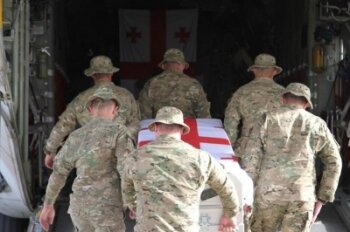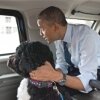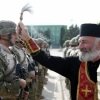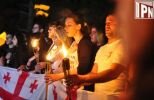Taliban Attack Kills 7 Georgian Soldiers in Afghanistan – The New York Times
07 June, 2013
 The New York Times published an article about Georgian soldiers’ death in Afghanistan.
The New York Times published an article about Georgian soldiers’ death in Afghanistan.‘A suicide bomber driving a truck packed with explosives attacked an isolated base manned by Georgian troops in Helmand Province on Thursday evening, killing seven soldiers after penetrating the outer perimeter, but failing to get inside the base, according to Georgian and Afghan officials in Helmand.
It was the second truck bomb attack on a Georgian base in Helmand in less than a month; the earlier bombing on May 13 killed three Georgians, according to Georgian defense officials. Helmand has been the deadliest province for coaltion troops.
The Taliban claimed responsibility for the attack in a text message sent to journalists.
The Georgian contingent is the largest non-NATO member of the International Security Assistance Force and because the country is not a NATO member, ISAF officials said they did not issue a news release on the bombing even though it was one of the most lethal this year for international coalition troops. The Georgian contingent of 1,570 soldiers is now based in one of the most dangerous areas of Afghanistan, helping to defend a province that the American Marines have drawn back from, leaving less than a third of the nearly 20,000 soldiers they once had in the province. The Georgians now have three bases in one of the most dangerous areas of Helmand, in the districts of Nawzad and Musa Qala.
General Irakli Dzneladze, chief of the Georgian army joint staff, told a news conference in Tbilisi, the Georgian capital, that in addition to the seven killed, nine Georgia soldiers were wounded. The incident brings to 30 the number of Georgians killed in Afghanistan.
“I offer my deepest condolences to the families of our fallen heroes and to all of Georgia,” President Mikhail Saakashvili of Georgia said in a televised address. “Our duty to their memory is to continue our path toward NATO membership,” he added.
The Georgian forces have sometimes appeared to lack the caution of the troops from other nations stationed in Afghanistan. In an e-mail earlier this spring to reporters inviting them to embed with Georgian troops, a Georgian press officer described the area where they operate in Helmand as “the triangle of violence” but offered to take reporters “on foot patrols in Afghan villages and to meet locals.”
According to some local elders the Georgian troops are not particularly well liked in the area because they arbitrarily stop people for searches, do not treat them with respect and don’t understand their language. However, local Afghan government officials said they found their presence helpful in helping to keep the roads open.
“They don’t know English and speak a Russian-sounding kind of language,” said Abdul Rahman Mutmain, an elder from Landy-Nawa where the Georgians have one of their three bases.
“Georgians are like our warlords, they don’t behave well with people,” he said. “Sometimes they stop passengers to search them and people complain they steal their belongings, their money, wrist watches and other valuables.”
“Once my car broke down near their base in Landy-Nawa,” he added. “They rushed towards me and forced me to take the car away from the area. I explained that I cannot take it away alone, but they didn’t help me to push the car nor would they let me to fix it. So they start abusing me and I didn’t know what they were saying and they didn’t know what I was telling them.”
Georgians contributed forces to both the wars in Iraq and in Afghanistan. They have been engaged in Afghanistan since 2004, and deployed to the area of Helmand where the attack took place when the British left, about three years ago, according to Afghan officials’ – the article published by The New York Times reads.
By ALISSA J. RUBIN and TAIMOOR SHAH
Related stories:
Appathurai's condolences to Georgian people over military losses in Afghanistan
Georgia mourns 7 soldiers - flags lowered in the country
Afghanistan suicide blast kills 7 Georgian troops





















































